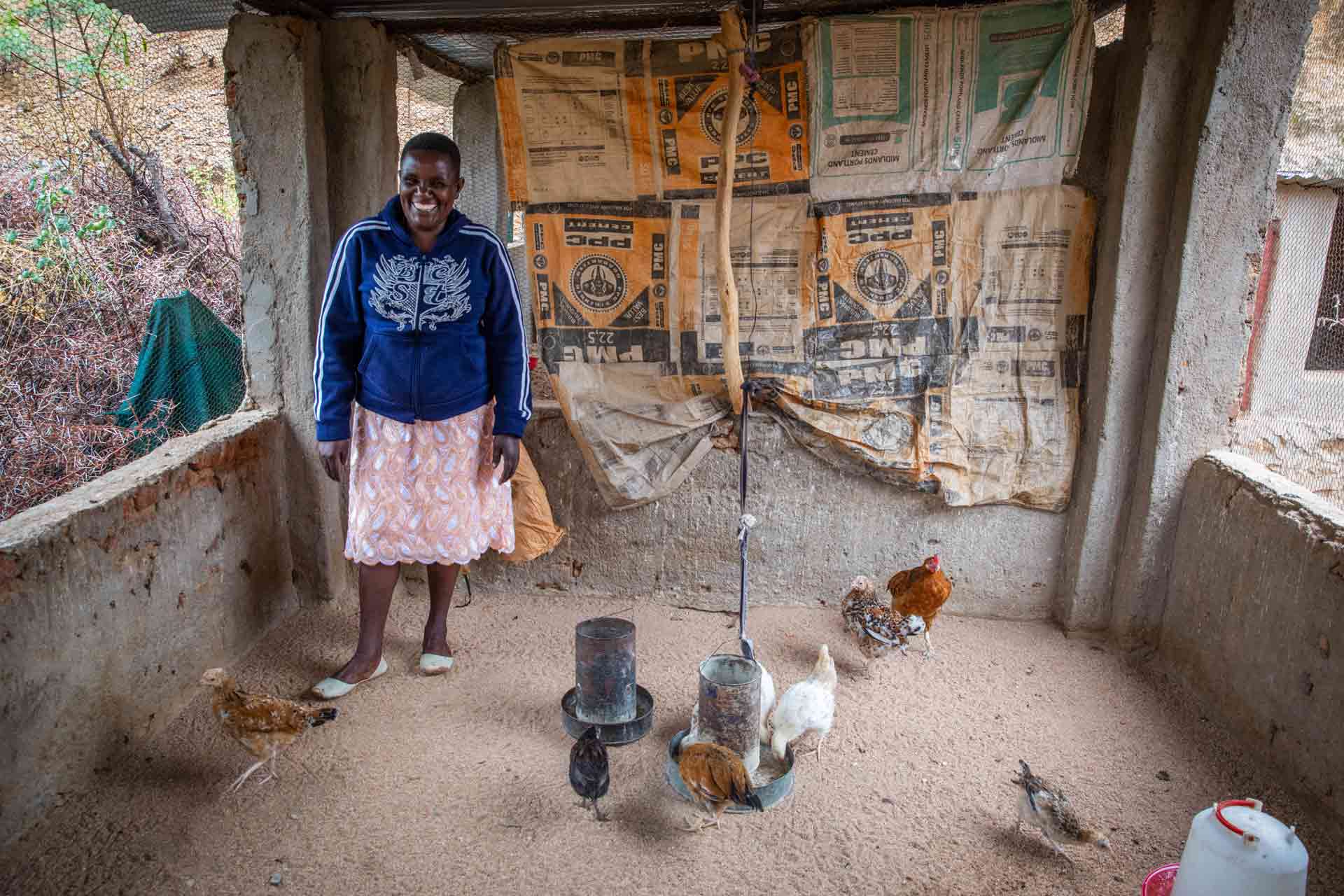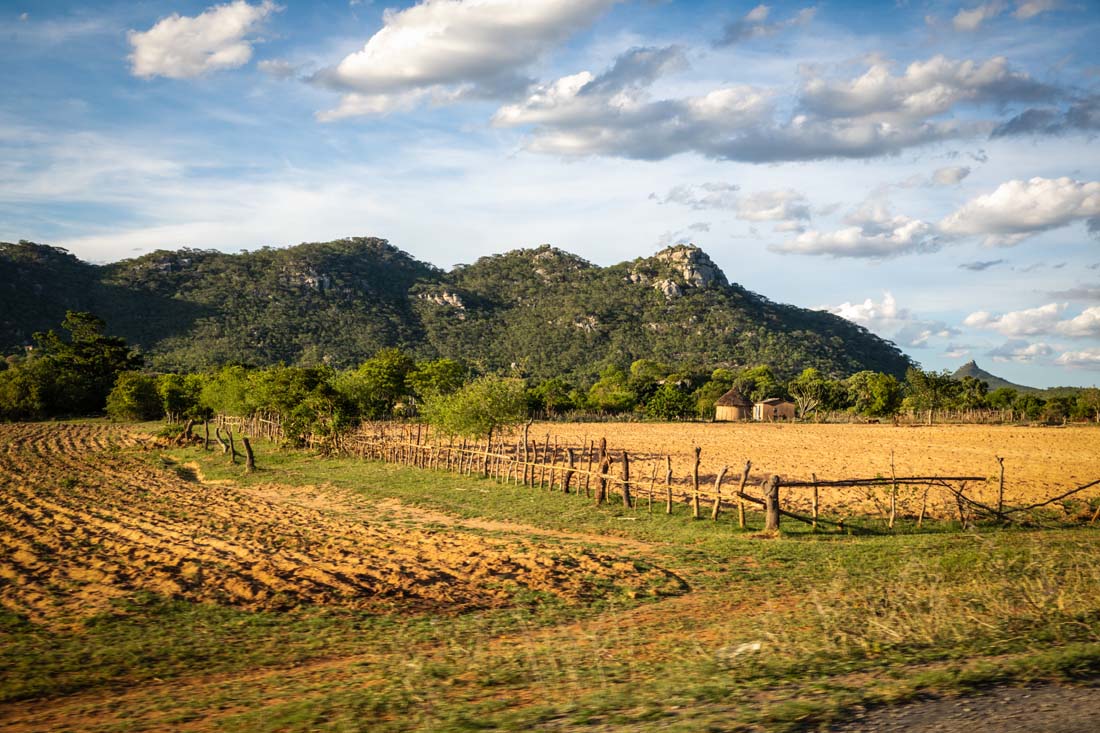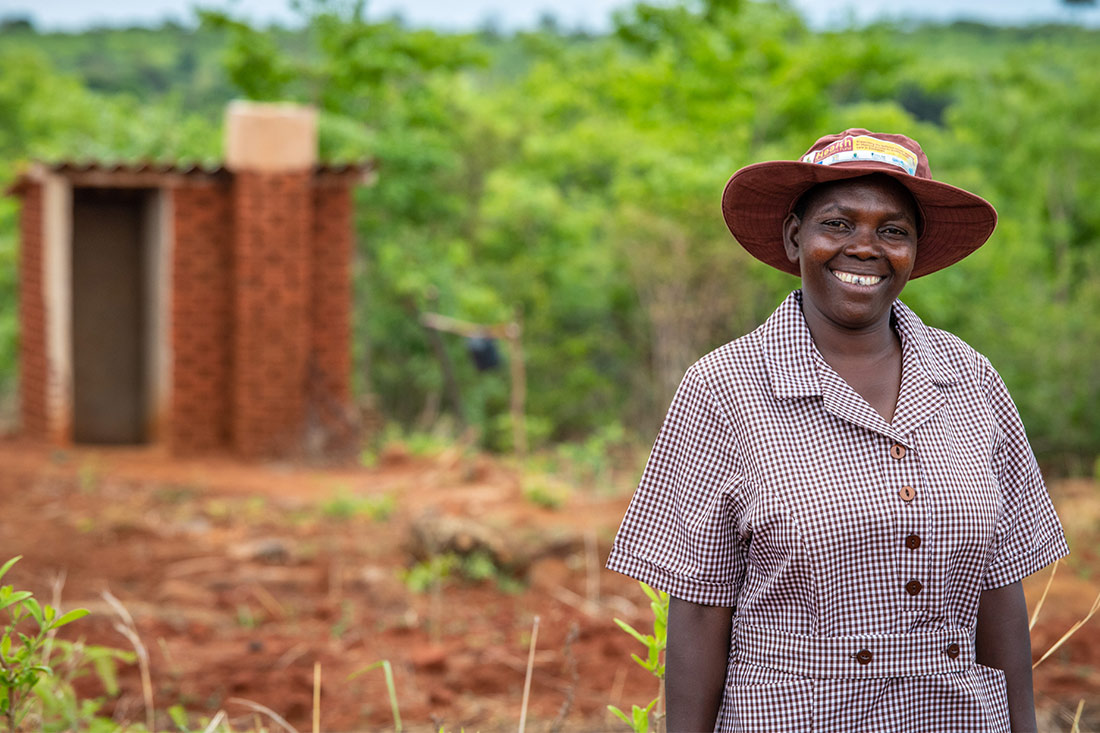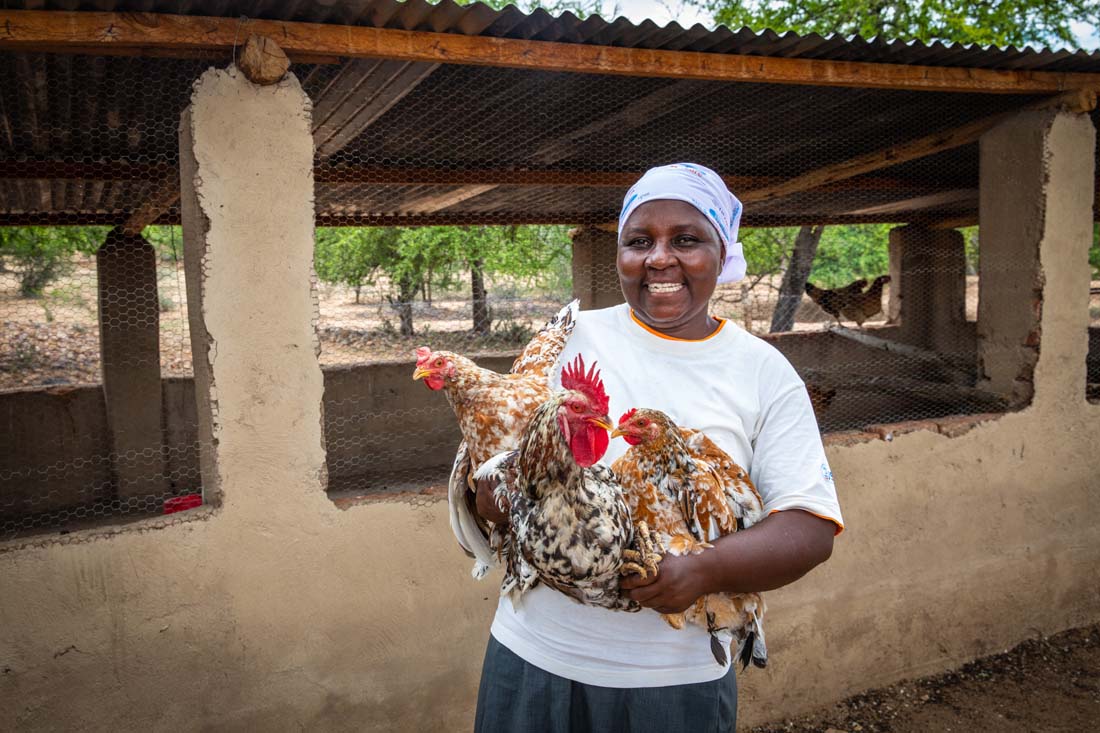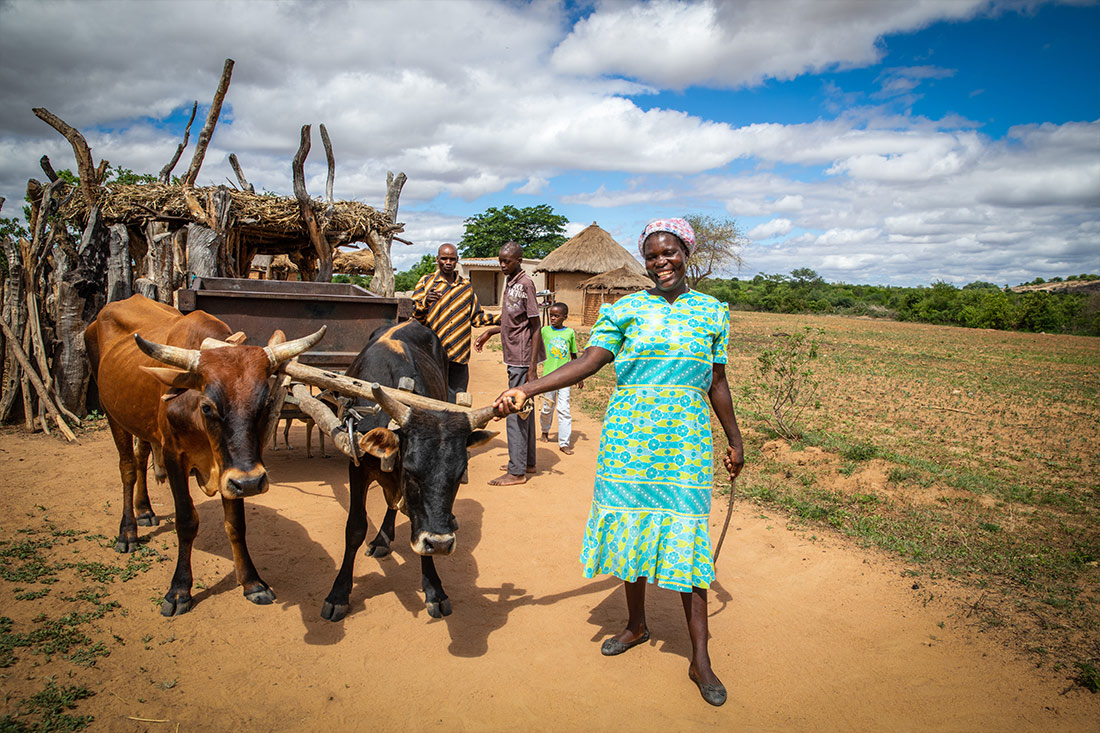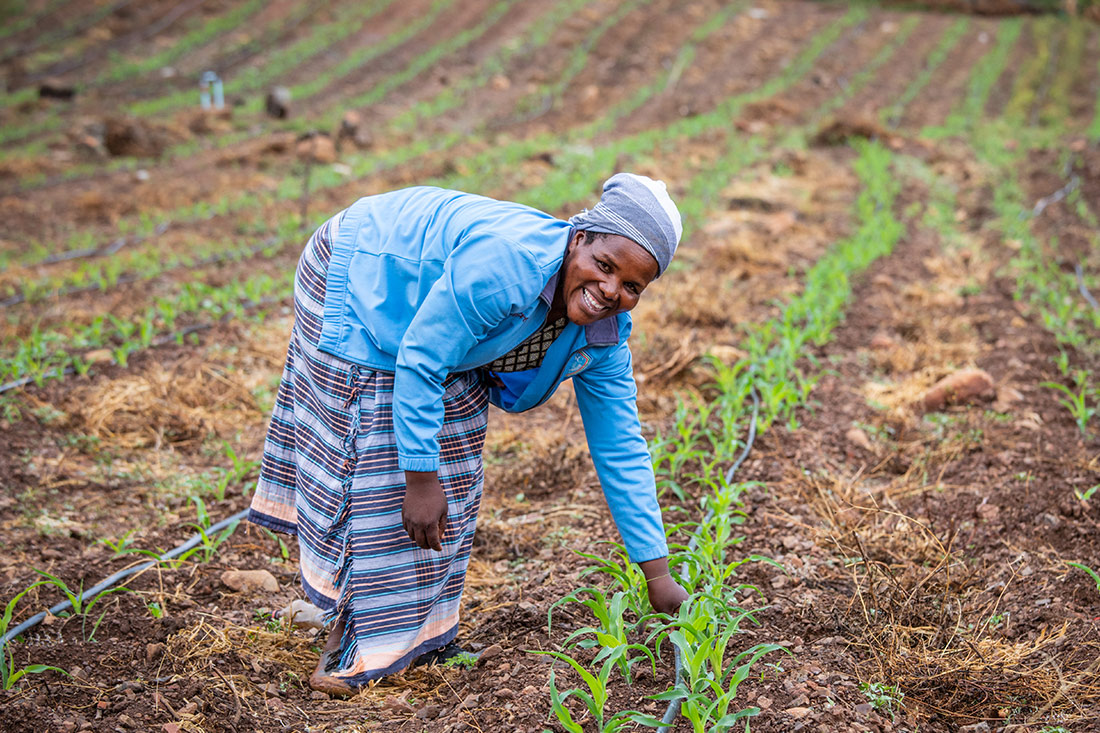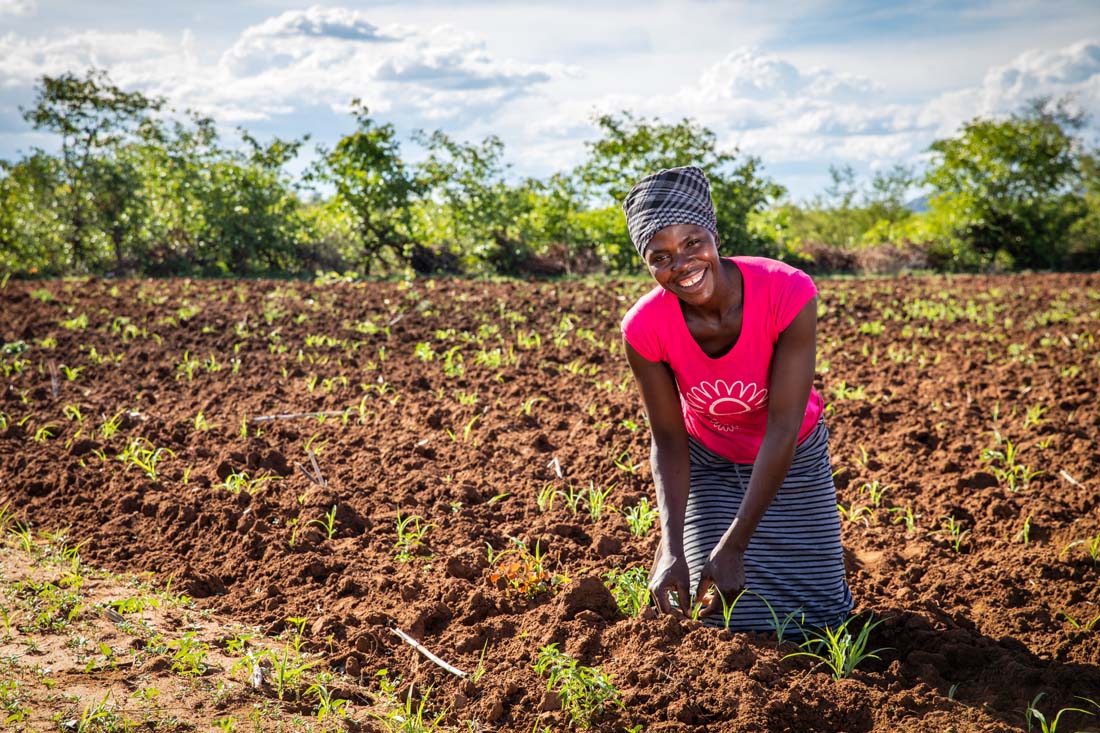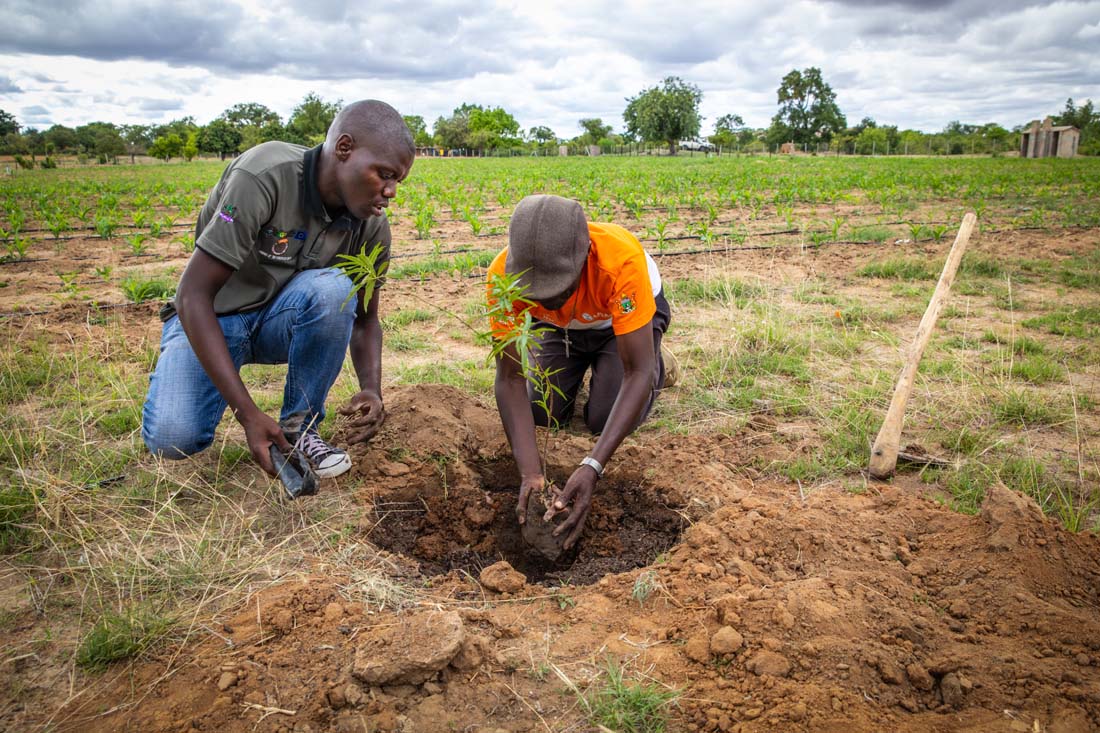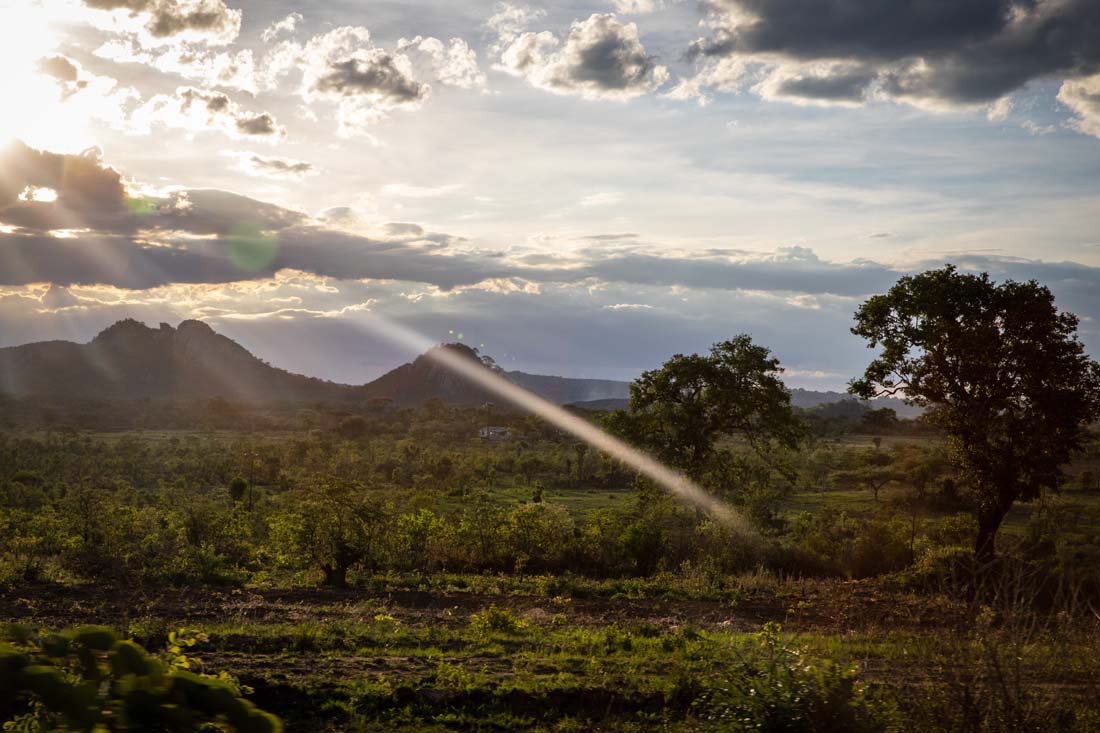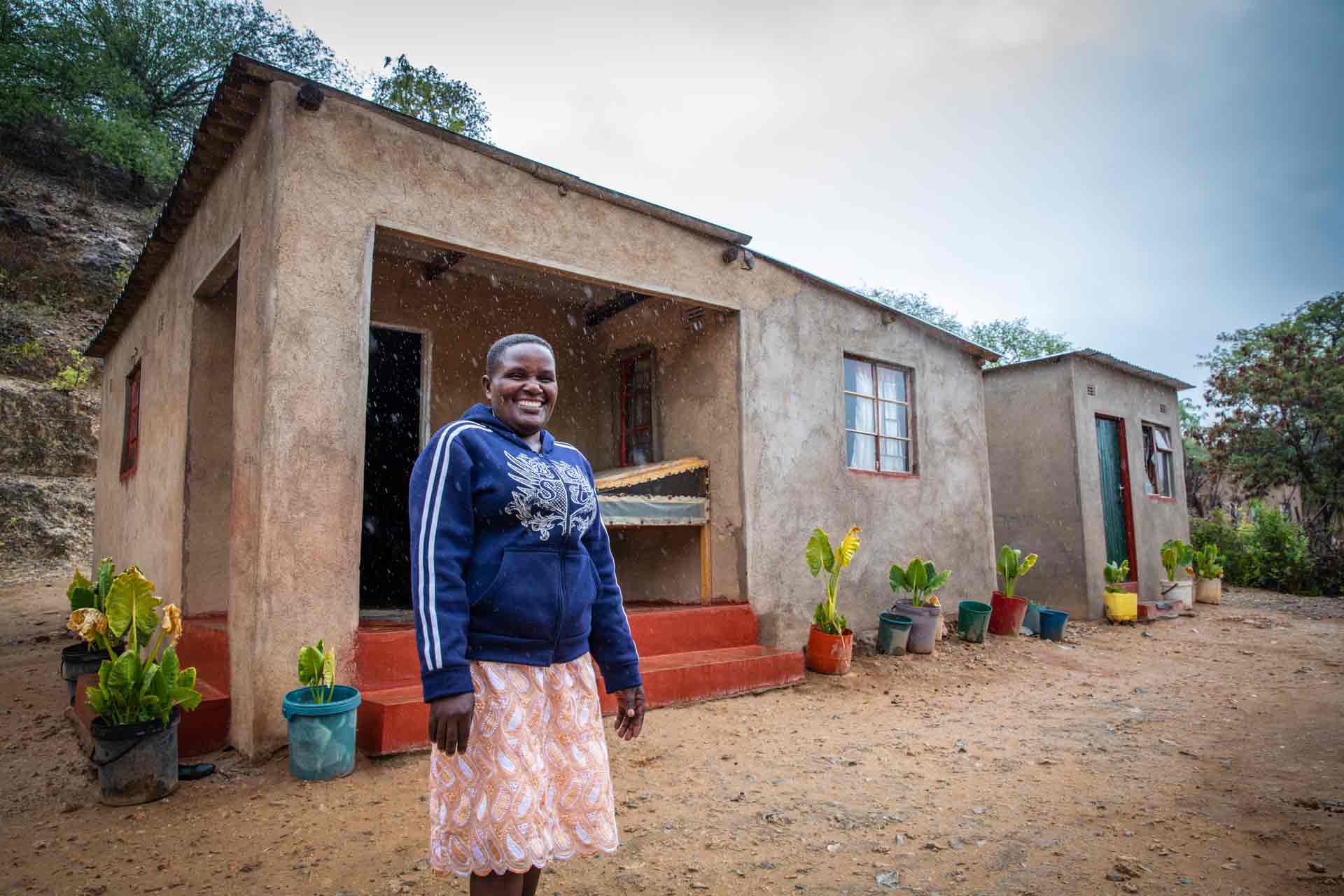
Woman overcomes tragedy to find resiliency and success in rural Zimbabwe
Story by Kristy J. O’Hara-Glaspie | Photos by Chris Huber
It happened so quickly that Rachel Johns couldn’t quite realize what happened. In 2009, one day her husband was fine. The next, he fell ill. Three days later he died. To this day, she doesn’t even know what took him away from her so rapidly. All she knows is the swirl it left her in.
“I felt very hopeless because he was the pillar, and I was doing nothing,” Rachel says. “Now that he was gone, it was like my whole life was shattered. That was the end of everything.”
She quickly realized that she would have to become the breadwinner for her household, but she had nothing to get her started, so she looked for help from others in her community, the Chipinge district of eastern Zimbabwe.
“I struggled to find some money to start up some income-generating activities,” she says. “Anytime I wanted to borrow from anyone, nobody would loan to me, so life was very difficult because I was used to my husband providing for me.”
She got a job selling floor polish, but she didn’t have enough money to invest in the product that would really make her business grow. She says, “I would be selling the black or white, but people wanted the red.”
Without products in demand, she struggled to have money to buy food. She says, “The children would have one meal in the evening.”
She also couldn’t provide the supplies her kids needed for class.
“When my children went to school, they could go barefoot and without enough books,” she says.
Often times, she couldn’t even afford their school fees. When it came time for children to be sent home for not paying, she says, “My children were the first to be expelled.”
Everything in her life felt so hard, and she wasn’t able to shield her children from the stresses that were engulfing her. They wanted to help her any way they could.
“Life was so difficult to the extent that my 13-year-old boy begged me to drop from school so he could go elsewhere to look for a job or live with someone else who could pay his school fees,” she says. “He said, ‘What’s the point? Let me at least drop out to help you provide and make life easier.’”
But she wanted more for her children, so she told him no while not knowing how anything would change. But little did she know, a huge change was on its way.
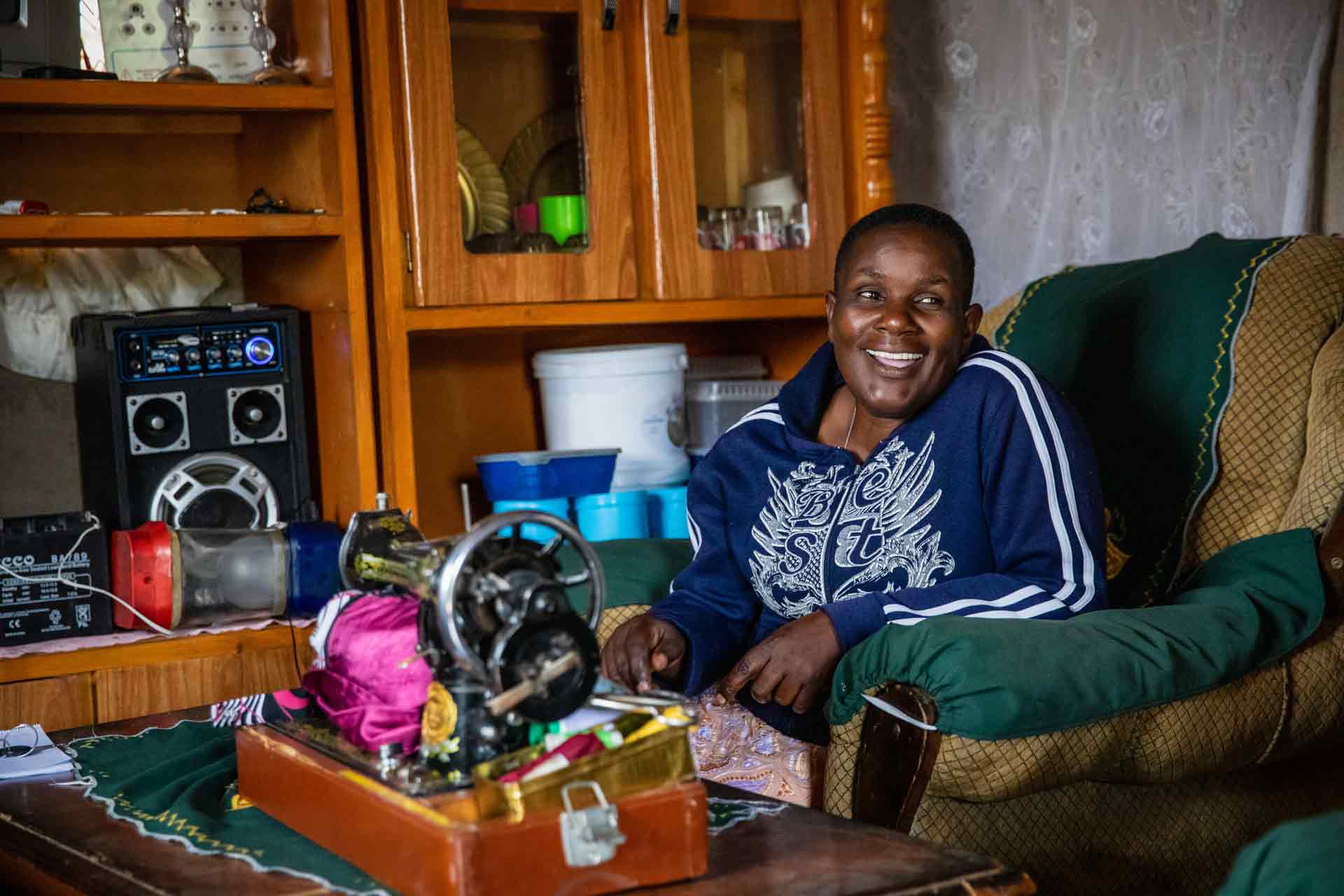
World Vision brings hope
In 2014, World Vision introduced the ENSURE program in Rachel’s community. The USAID-funded program aimed to increase families’ resiliency and food security through livelihoods and nutrition programs. One of the first activities that Rachel and about 120 other community members were invited to participate in was savings groups. Where Rachel lives, it’s difficult for people living poverty to have access to bank services, so savings groups can help bridge the gap. These groups help provide opportunities to save by having members pool their money and loan to each other.
Rachel had already been part of a local savings group started by another organization. But this group wasn’t operating very well and hadn’t helped her or the other group members move forward.
“When they lent some money, one would just take five months without repaying the loan, and we would have to wait for him or her, and then we could move forward,” Rachel says.
Without loans getting paid back on time and with interest, group members were simply saving but not seeing their money grow. So Rachel wasn’t gaining anything, and her problems continued to mount. So while savings groups hadn’t quite worked for her so far, she was so desperate for change that she heard the facilitators out.
They taught key principles that could help groups succeed, such as the importance of record keeping, having a group constitution with bylaws that members had to adhere to, and how to effectively handle conflict. In April, a cluster group of 18 savings groups started, and Rachel joined one.
Six months later, her group had their first share-out, in which the accumulated money is dispersed to the members, who are encouraged to use their earnings to purchase something large as a tangible reminder of their success and an encouragement to keep moving forward. Across all the groups in their cluster, the members had collectively generated nearly US$9,000. They were amazed.
“I started realizing [life could change] after the first share-out because the amount of money — I never expected or dreamed I’d have that kind of money,” she says.
Rachel and everyone else in the cluster group were able to buy goats and chickens. Rachel also used some of her savings to construct a toilet and piped water at her house. In fact, across all the ENSURE program areas, the number of houses with an improved source of drinking water grew from 44.2% to 52.7% over the life of the program.
Going into their second savings session, group members were now highly motivated.
“After the first share-out, we now had some know-how from the technical officers, so we upgraded the groups from $5 to $10 or $10 to $20, due to the realizations of the profits we made,” she says. “We scaled up our savings.”
After her second share-out, Rachel was able to buy a refrigerator. She uses it to keep beverages cold, and she then sells those beverages along the roadside for income.
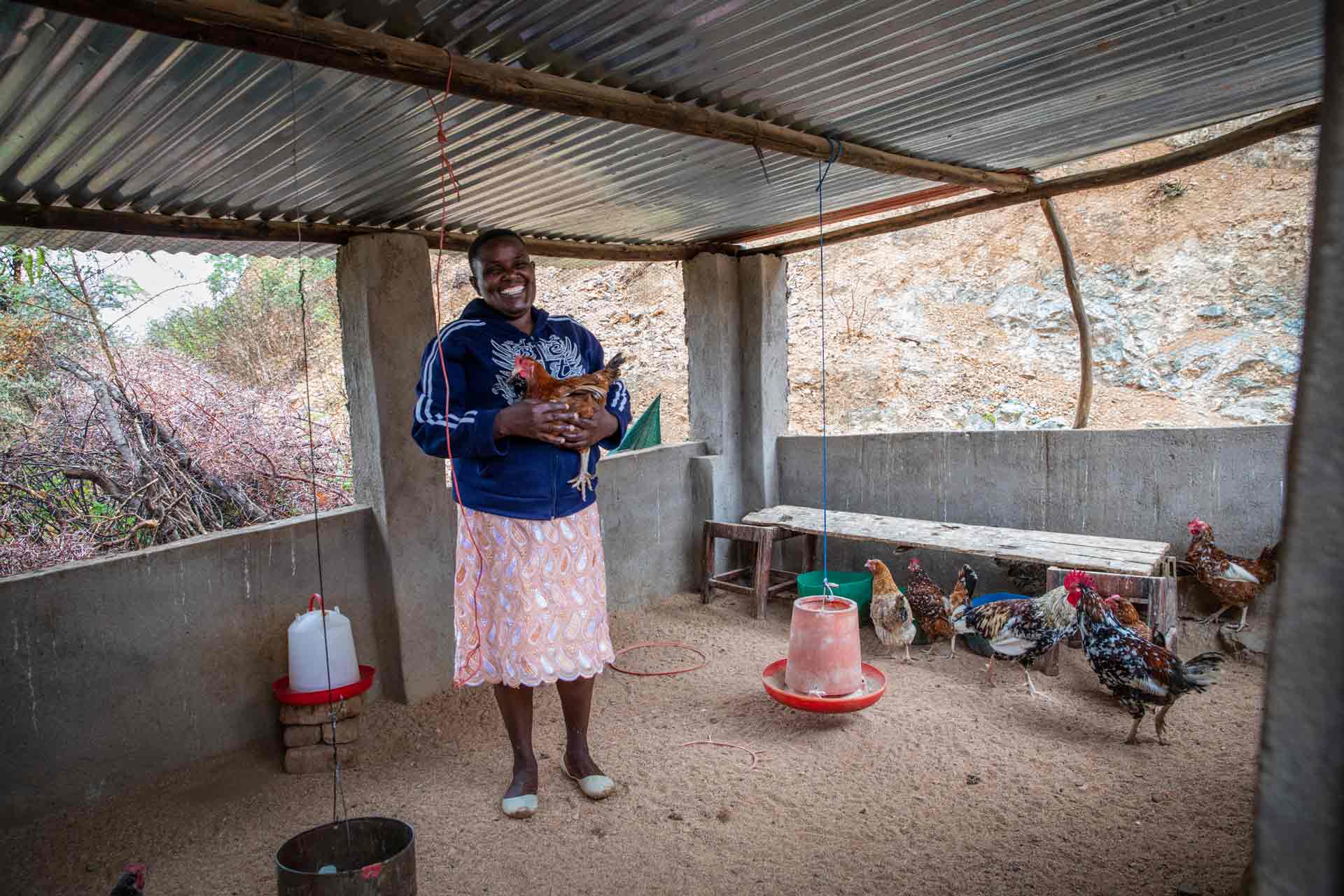
Growth
As Rachel began to build a better life, she was honored to be elected to serve as a cluster facilitator leading all the savings groups in her community. But in a patriarchal society, a female leader is often cause for scrutiny, especially one who no longer has a husband too.
“There are names associated with me,” she says.
But it doesn’t deter her. She had tasted the beginnings of success and was ready for more, not only for herself but for her children and their whole community.
As the cluster group saw continued success from its savings, it started rearing chickens. ENSURE staff helped introduce an improved chicken breed from South Africa that was healthier and produced more eggs. In August 2016, ENSURE staff also connected group members to Metbank and National Organic Produce (NOP) for egg production. Creating these partnerships were key for people like Rachel because many people living in poverty lack the collateral to be able to work with established banks, and they lack the production level on their own that’s needed to sell to large organizations like NOP.
“It just took a few microfinance institutions and one or two banks who had confidence,” says Richard Ndou, who has served as chief of party overseeing the entire ENSURE program.
The percentage of people in ENSURE program communities that had access to financial institutions grew from 14.2% to 27.5% throughout the life of the program. Being able to work with these organizations helped provide a tangible business opportunity to community members.
“With egg production, a lot of people have made their achievements,” Rachel says. She was able to expand her house and put in an extra room with her egg profits. “Basically, this was the foundation for everything I did.”
As she and the others saw success with their eggs, they moved into a second phase: raising chickens for meat as well. She took out a US$400 loan for meat production, but due to inflation, the market that was supposed to buy her meat couldn’t stick to their agreement, so she had to look for other places to sell. She was able to sell them locally and repay the $400, even with the inflation.
“We’ve tasted and enjoyed the profits from the egg and meat production, but we no longer want to buy from people,” Rachel says. Instead, she and five members managed to save up and buy an egg incubator for US$434. This wasn’t easy, as the purchase price was in U.S. dollars but most of the income-generating activities were happening in the newly reintroduced Zimbabwe dollar, which has struggled.
“Now, if you want some chicks, you call Mai White, and I send some,” Rachel says beaming as she calls herself by the nickname she is known by in the community.
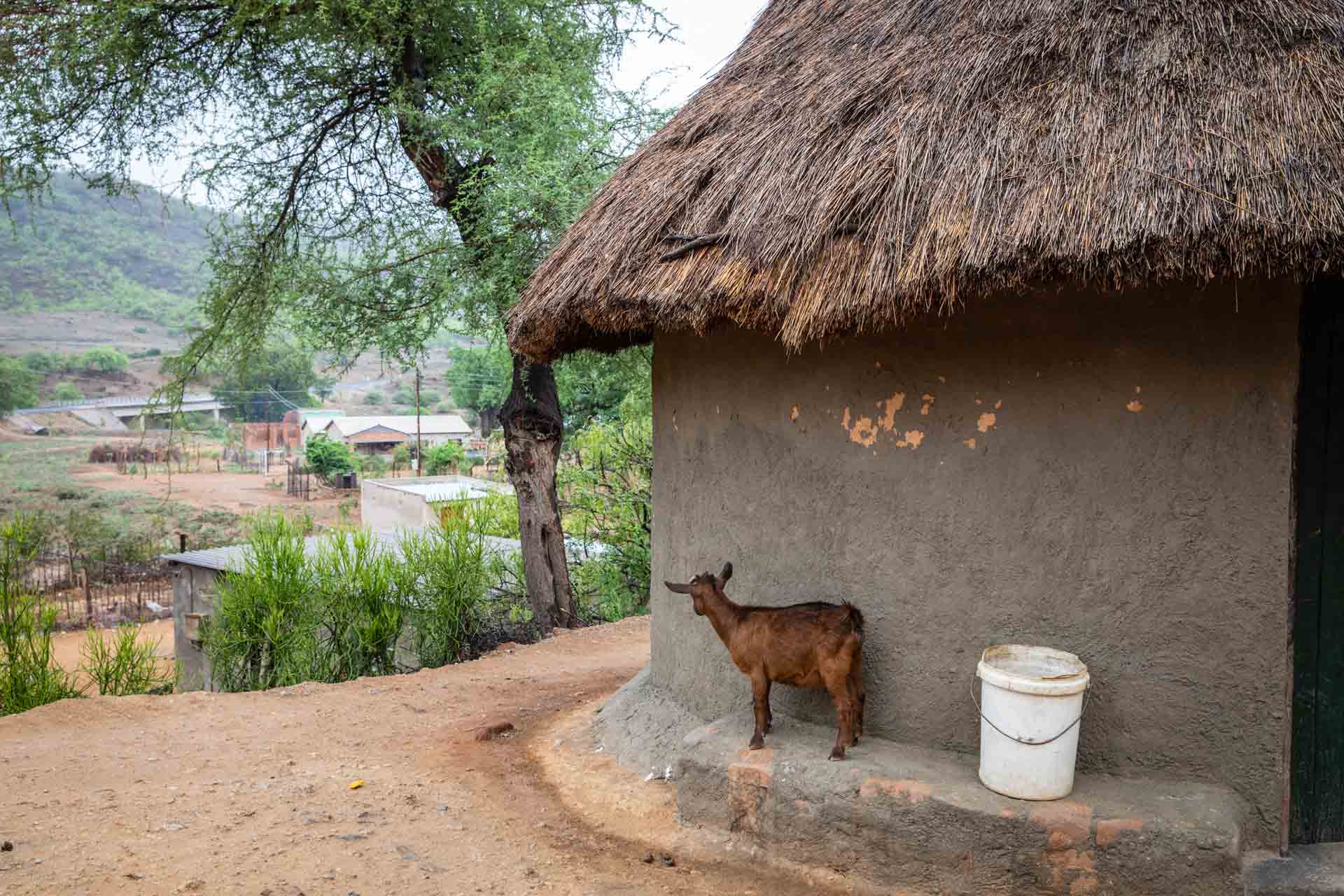
A future
Because of her success, Rachel, now 39, has also been able to build bedrooms for her children and was one of the first women in the area to get a bank account, which is no small feat since she’s a woman, and beyond that, most people are denied due to a lack of assets. In fact, ENSURE has worked to help change mindsets around what women can do, upending centuries-old thoughts in the community.
“Women could not own cattle because it’s a patriarchal society,” she says. “The only cattle a woman should have is a cow for a baby girl to get married one day. Now there are women who have got cattle. Some of the women now have cattle, goats, chickens.”
She still encounters people who call her names, like prostitute, because they can’t understand how a woman could earn so much money and be successful, but she doesn’t let it bother her because she knows she’s on the right track, and most importantly, her family is free for the financial strain that seemed to engulf them for so many years after her husband’s death.
“Now we are having three meals, and all is well,” she says. “We can now also eat whatever we want to eat, and we can now budget.” The family often travels to South Africa to buy their food supplies for the month due to inflation in Zimbabwe. She can also purchase other drinks to sell while there, which gives her and advantage with a more diversified product offering.
Rachel is proud that she is able to pay school fees for the entire year in advance now. She has also expanded her business ventures and now sells dishes and kitchen supplies. She’s even an employer, paying two women to sell those cold beverages on the side of the road.
“I’m seated here, and I’m not even thinking about how it’s raining,” Rachel says as she sits in her living room with a huge smile on her face while motioning toward the door where the water pours down outside. “Now I’m sitting pretty. I no longer want to go to town — the town should come here.” It’s a local way of saying that her life is well now.
As Rachel looks ahead, she is motivated, encouraged, and not deterred by setbacks. For example, as the government institutes power cuts, it has impacted her group’s chicken incubator, but instead of getting upset about it, they found a solution. The group saved up US$3,500 and converted the incubator to run off solar energy — all while also saving up and helping one of their group members who was in the hospital with severe burns.
Even though she’s achieved so much, Rachel isn’t done dreaming. She wants to learn how to drive and then eventually buy a car. And she also has big ideas for her family’s future.
“My dream is that I buy an estate and build a five- or six-room house, so I realize income from rentals,” she says. She sees it as her legacy to pass on to her children. “The kids will be fine and find revenue from the rentals. [They’ll say,] ‘Our mother left a big house for us — that house will be feeding us.’”
Being able to think about her legacy and the life her children would have when she is gone was also a new concept. Rachel’s cluster group was also able to collectively plan for the future by dedicating an entire share-out session toward end-of-life planning. The group saved US$33,000, and every cluster group member was able to buy a funeral policy so as to not burden their family members when they die one day. She says, “I’m not afraid to die because there’s a coffin.”
She says it calmly and unrattled, and that’s how she is now, even after life seemed so challenging for so long. No longer is each day filled with anxiety and stress. Instead, she can confidently feed her family and provide for their needs, and now she has the luxury of dreaming — all things she never thought possible.
“I want to thank ENSURE because right now, my life has been transformed because of the ENSURE project and the trainings for capacity building,” Rachel says. “… When you want something, you have to work, and you get something instead of just getting handouts. And when they’re finished, you don’t have anything to rely on. With capacity building, it’s ongoing, and you have the knowledge. Wherever I am, I will always remember ENSURE. Thank you for coming, and if possible, can you grant more trainings on capacity giving.”
